In their Feb. 21 talk, Anne Williams-Isom, FCLC ’86, deputy NYC mayor for Health and Human Services, and Catherine Blaney, FCLC ’86, development lead at Bloomberg Philanthropies, encouraged students to consider opportunities in government, nonprofits, and more.
The pair, both of whom are members of Fordham’s President’s Council, spoke in Keating Hall at Rose Hill to more than 150 students in the symposium, part of Fordham’s pre-law offerings, which also include advising, programming, and clubs. The symposium brings in speakers to help students learn about careers, prep for the LSAT, and analyze mock cases.
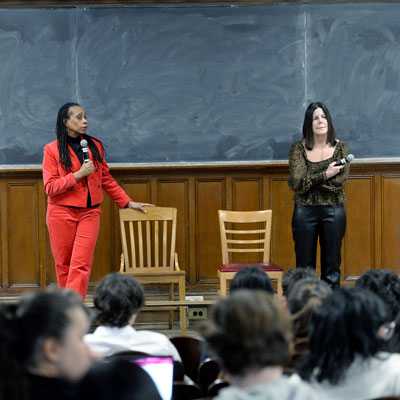
Though Williams-Isom has spent much of her career in government and nonprofits, she said the training she got in law school was “very important” to her work.
“I wanted to be a good writer, I wanted to increase my analytical skills [and] be able to synthesize information quickly,” she said.
Williams-Isom, previously the CEO of the Harlem Children’s Zone, said that she often pairs those skills with values she learned at Fordham.
“Through all of this, the decision to go to Fordham and to want to focus on justice, and to want to focus on service—I do think I have come full circle in what I’m doing … and how I’m able to lead at this moment,” she said.
Blaney said that “law school is a place that allows you, when you graduate, in whatever job you take, to think five steps ahead.”
That way of thinking helped her develop a close connection with her boss, Michael Bloomberg, the former New York City mayor.
“He is a very precise, analytical, driven human being, and he wants to put action and results together, and he wants you to quickly analyze the problem and come up with a decision,” she said.
Thinking about Public Service and Law
For students, learning about the different paths and skills that law school can provide made an impact.
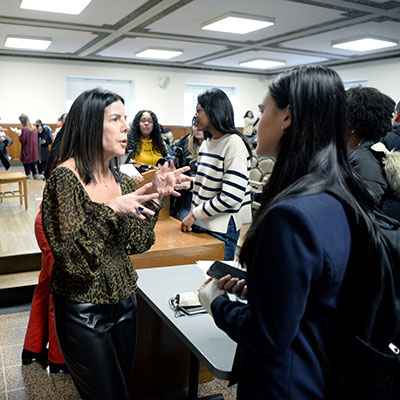
“I want to become a lawyer, but more the public service route—I want to be helping communities do better,” said Vincent Brandy, a first-year Fordham College at Rose Hill student, who plans to major in international studies.
Sinclair McKinney, a first-year Fordham College at Rose Hill student studying environmental studies, said that she appreciated learning about the role Fordham played in the speakers’ careers.
“The most interesting for me was … how Fordham’s focus on social service and helping others has followed them throughout their lives and led them to where they are,” she said.
Jade Belliard, a junior at Fordham College at Rose Hill majoring in history, said that she appreciated their message that students can “do anything with a law degree,” and that they spoke about balancing their careers and family.
“Especially for women, I feel like you have to choose between a career or starting a family—especially being in law,” she said. ”It was kind of a relief that they were like, ‘just go for it.’”
Additional reporting by Franco Giacomarra.
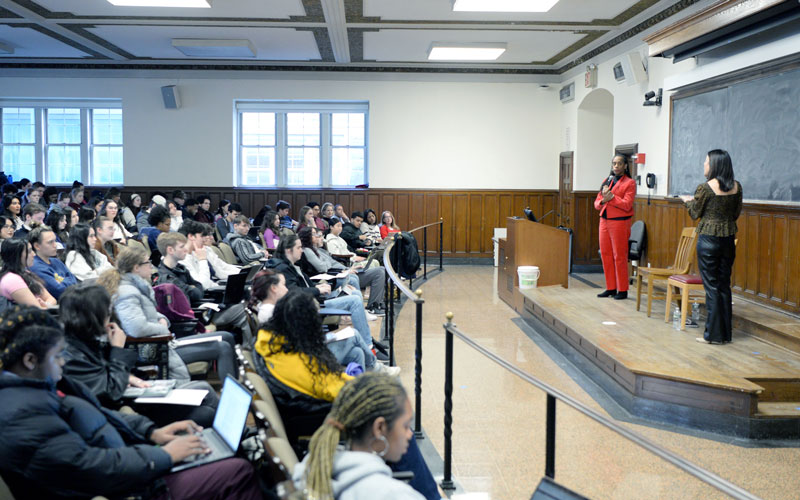
The symposium, titled “Leading for Change: How to Create Sustainable Impact in Children and Family Services,” brought together agency leaders, government officials, service providers, and more to learn about how partnerships can improve care and how the system can work to confront challenges.
Anne Williams-Isom, FCLC ’86, New York City deputy mayor for health and human services, helped organize the symposium to provide a place for professionals to learn with and from each other. While Williams-Isom was unable to attend, she said that the idea for the forum came from the legacy of James Dumpson, the late activist and leading social crusader who served as the city’s first black welfare commissioner and as GSS dean from 1967 to 1974.
“So much of Dr. Dumpson’s work was about the intersection of policy, practice, and research—he wanted to ensure that NYC children, families, individuals, and communities were supported with dignity,” said Williams-Isom, who served in leadership positions in the city’s child welfare system for many years before going on to lead the Harlem Children’s Zone, an education and anti-poverty nonprofit.
John Mattingly, a former head of New York City Administration for Children’s Services (ACS), encouraged those in attendance to value the importance of public service.
“Public service creates public value,” he told those in attendance. “The work that we highlight tonight is one example of public service going back into the mid 1990s. And still going on here in New York City as we speak.”

A Look Back
Mattingly, who served as the welcome speaker, set the stage for the first panel, which featured a look back at the history of ACS. The panel included Linda Gibbs, who served as deputy mayor for health and human services for New York City; Gerard McCaffery, the former president and CEO of MercyFirst, a nonprofit human and social service agency; Sister Paulette LoMonaco, formerly of Good Shepherd Services; and Fred Wulcyzn, the director of the Center for State Child Welfare Data, Chapin Hall, at the University of Chicago.
Shirley Gatenio Gabel, the Mary Ann Quaranta Endowed Chair at GSS, who served as the moderator, highlighted the strides that many of the panelists had made during their time working with or for the city.
“There’s one statistic that keeps on coming to mind—in 1996, when ACS was founded, there were 50,000 children in care, and today, there’s 6,800,” she said. “So I think we can all agree that’s 6,800 too many children in care, but what an accomplishment. And a lot of that accomplishment is due to the hard work of people on this panel and people in this room, and many others working together to create a new system for children.”
The Importance of Data
Wulcyzn said he’s seen how data and story collection from those in the system can help to make improvements. He has about 4.5 million records of children in foster care since the late 1970s, when they first started tracking children’s experiences—at the time on index cards, compared to today’s more modern, efficient system.
“In the last 45 years or so, we have completely changed [the system], and our ability to know something that was happening to children is extraordinary,” he said. “And at the time with Linda and Nick [Scoppetta, the first head of ACS] and all the people who worked at ACS at that time, it was the first time we really had a chance to demonstrate what could be done to take those stories seriously and use them to make a better system.”
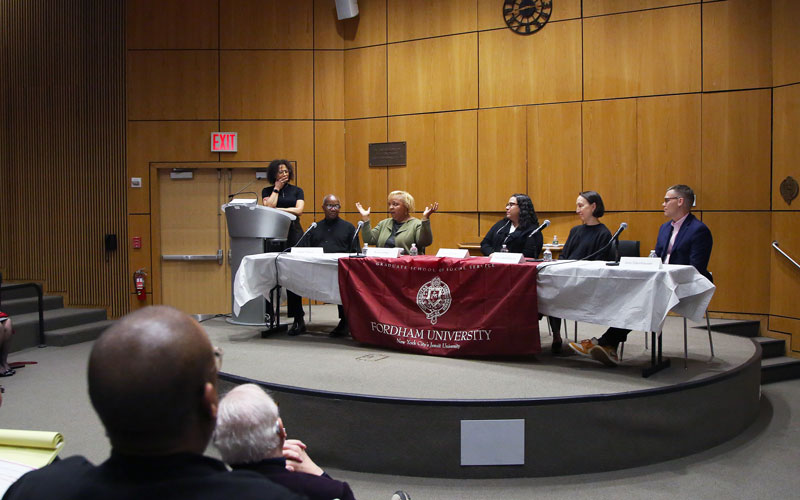
Addressing Current Issues
While panelists acknowledged that progress had been made in serving children and families, the second panel of the evening highlighted some of the challenges that still need to be addressed. The panel featured Jess Dannhauser, the current ACS commissioner; Julia Jean-Francois, the co-executive director at the Center for Family Life; Benita Miller, the executive director of Powerful Families, Powerful Communities; Raysa Rodriquez, chief program and policy officer at Federation of Protestant Welfare Agencies; and Willie Tolliver, professor at the Silberman School of Social Work at Hunter College.
Jennifer Jones Austin, LAW ’93, the CEO of the Federation of Protestant Welfare Agencies, an anti-poverty, policy, and advocacy organization, served as the moderator. She said that as she listened to the speakers from the first panel, she kept thinking of the word sankofa, which is an African word from a tribe in Ghana.
“The literal translation of the word sankofa is ‘it is not taboo to fetch what is at risk of being left behind,’” she said. “What it means is taking from the past what is good and bringing it into the present to make progress in the future.”
Jones Austin said that she saw this as the goal of the evening—to look back on the history of ACS and to engage in “constructively critical analysis” of child welfare.
Miller said one of the things the agencies should keep in mind as they continue this work is the need to keep the community and the voices of children at the center of it..
“For me, it was very, very important to bring in folks who were impacted by the system to the conversations that were happening around their lives,” she said.
Inequities and Underlying Causes
Jones Austin emphasized that the system is set up to “treat the symptom.”
“To solve the problem, we have to get at the underlying cause that created the problem in the first place,” she said, citing examples of structural inequities such as poverty, mass incarceration, economic deprivation, social and emotional well-being, and a lack of clinical resources in communities. “We’re not going to solve these problems by just pouring more money into systems that are in place, at best, to treat the system.”
Dannhauser also highlighted the disparities that he and his team are working to address.
“There’s disproportionality throughout the entire system—the most disparate point is at the point of the call,” he said. “It’s 6.6 times more likely that a Black family be called [into ACS]than a white family in New York City. That means, according to one study, that we are investigating almost half of Black families in New York City—44%. And that’s something we’re working really hard on to fix.”
One way is through providing families with resources upfront, he said.
“We have a lot of work to do around how we engage families. We are very open in this administration that it may not be right for ACS to be building all of the solutions, but that there should be other areas that are created, and we have a long way to go.”
Williams-Isom said the goal of the forum was to focus on “how to create sustained reforms over many years in children and family services.”
“The panelists demonstrated the power of diverse teams to bring about systemic change and large-scale reform,” she said in an email following the event. “This needs to happen throughout the entire human services system so that we can reimagine what is possible so that people can truly thrive. I am so proud that Fordham GSS is at the center of this very important work.”
]]>This year’s Pioneering Women have enhanced all areas of the University, from endowed faculty chairs and student scholarships to community engagement programs, academic research, and facilities. Many of them have advanced Cura Personalis | For Every Student, the University’s $350 million campaign that is creating a wealth of learning opportunities for students and helping to make a Fordham education more accessible and affordable, particularly for lower-income, underrepresented, and first-generation college students.
The 2022 Pioneering Women in Philanthropy at Fordham honorees are
Kim Bepler
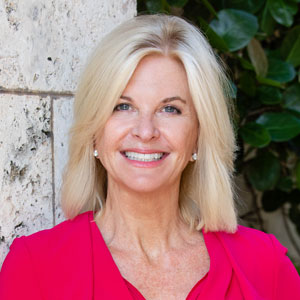
A Fordham trustee and the executive trustee of the Stephen E. Bepler Estate and Trust, Kim Bepler is one of the University’s most generous supporters. Since her retirement in 2002, she has devoted much of her time to philanthropy, focusing her efforts on causes directly related to the Jesuits and Jesuit education. She received an honorary doctorate of humane letters from Fordham in May, and in 2007, she was a recipient of a Fordham Founder’s Award, alongside her late husband, Steve Bepler, FCRH ’64.
She recently supported the creation of an endowed chair in the natural and applied sciences, adding to the four endowed chairs—in mathematics, physics, chemistry, and biology—she and the estate of her husband established five years ago. She also has helped create and support student scholarships, including the Fordham Founder’s Undergraduate Scholarship Fund, and contributed to renovations to the University Church and the McShane Campus Center, among many other initiatives.
Mary Byrne, Ph.D., TMC ’72, GSAS ’78, ’83, PAR
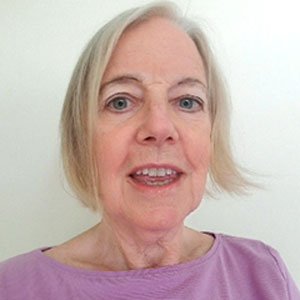
A three-time Fordham graduate, Mary Byrne is a clinical psychologist with a private practice in Eastchester, New York, that focuses on individual psychotherapy for adults with anxiety and depression. Previously, she was a staff psychologist at Four Winds Hospital in Katonah, New York, and worked on the crisis unit of the Community Mental Health Center in Bridgeport, Connecticut.
In 2009, Byrne and her husband, Thomas Rogan, established an endowed scholarship fund at Fordham to benefit doctoral candidates in psychology. They named the fund in honor of Marvin Reznikoff, Ph.D., her doctoral dissertation mentor who became a family friend. After he died in June 2013 at age 88, Byrne spoke at a memorial service at Fordham. She said Cicero “must have been thinking about someone like Marvin” when he observed: “The life given us by nature is short, but the memory of a life well spent is eternal.”
Joy Fernandez, GABELLI ’88

After graduating from Fordham with a degree in accounting, Joy Fernandez began her career at EY in the entrepreneurial services group. After her children were born, she adopted a flexible work arrangement—and it didn’t stand in the way of her making partner in 2003: Fernandez was the Long Island office managing partner for five years before transitioning into her U.S. East regional independence leader role. She has been a generous supporter of the Gabelli School of Business Undergraduate Scholarship Fund and the school’s accounting program. EY is also an annual sponsor of the summit.
Kathleen Anne Ford, J.D., FCRH ’75, LAW ’78
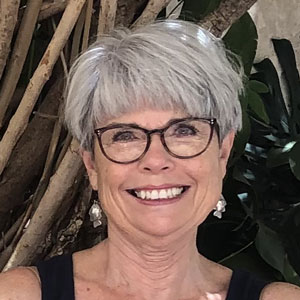
Kathleen Anne Ford was a member of the first class of women to graduate from Fordham College at Rose Hill in 1975. After earning a J.D. from Fordham Law School three years later, she spent her entire career in public service, including roles at the Brooklyn District Attorney’s Office, the Organized Crime Strike Force, the United States Attorney’s Office, the Office of Enforcement Operations at the U.S. Department of Justice, and the Securities and Exchange Commission. She received numerous awards throughout her career, including the Attorney General’s Award for Exceptional Service, the FBI Director’s Letter of Recognition, and the SEC Chairman’s Award for Excellence.
At Fordham, she and her husband, Joseph Ford, established the Kathleen Anne Ford, FCRH ’75, LAW ’78, Endowed Scholarship Fund in 2013. Since then, it has provided financial support for two students at Fordham College at Rose Hill and two at Fordham Law.
Theresa Lim Mao, Ph.D., GSAS ’60, ’64

Theresa Lim Mao is a retired chemist, businesswoman, and philanthropist. A native of Taiwan, she moved to the U.S. when she was 18 years old. In 1964, after earning her Ph.D. from Fordham, she was hired by Exxon Mobil Corporation, then known as Esso Research, as the company’s first female chemist with a doctorate. Unfortunately, when Mao was 46, her husband, Peter T.H. Mao, M.D., died suddenly, leaving her to provide for their two daughters and prompting a career switch to real estate investment. At Fordham, Mao recently started a fund to support Campus Ministry retreats and other events to foster a greater sense of community among graduate students.
Ann Marino, R.S.H.M., MC ’63
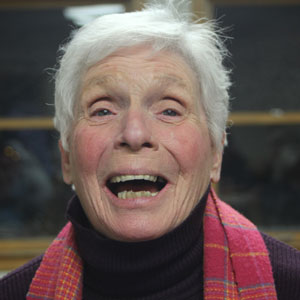
A Catholic nun, Ann Marino grew up in the Bronx and graduated from Marymount College in Tarrytown in 1963. Sister Marino entered the Religious of the Sacred Heart of Mary in 1957, and since then, she’s taught in schools owned and staffed by the R.S.H.M. in New York and in Colombia, Spain, and Italy.
Anne Williams-Isom, FCLC ’86
Anne Williams-Isom is the James R. Dumpson Chair in Child Welfare Studies at the Graduate School of Social Service and a 2018 recipient of an honorary degree from the University. In January 2022, New York City Mayor Eric Adams appointed her to serve as deputy mayor for health and human services. A native of Queens and an alumna of Fordham College at Lincoln Center, she earned a J.D. from Columbia Law School. Prior to serving as a deputy mayor, Williams-Isom was chief operating officer and then chief executive officer of the Harlem Children’s Zone. She began her career in child welfare as the deputy commissioner of community and government affairs at the New York City Administration for Children’s Services.
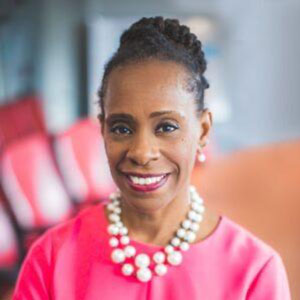
She has been a loyal supporter of the Fordham Founder’s Undergraduate Scholarship Fund, Fordham’s Higher Education Opportunity Program, and a member of the President’s Council, a group of successful professionals and philanthropists committed to mentoring Fordham’s future leaders.
A total of 33 women have been honored as Pioneering Women in Philanthropy since 2017, helping to provide Fordham and its students with resources, mentorship, and support.
If you missed the 2022 Women’s Summit, check out our full coverage of the day.
]]>Anne Williams-Isom, FCLC ’86, the deputy mayor for health and human services in New York City and the James R. Dumpson Chair in Child Welfare Studies at Fordham’s Graduate School of Social Service, served as the moderator of the panel, which featured Celia Fisher, Ph.D., the Marie Ward Doty University Chair in Ethics and founding director of Fordham’s Center for Ethics Education; Rev. Bryan N. Massingale, S.T.D., the James and Nancy Buckman Chair in Applied Christian Ethics at Fordham; and Professor Iftekhar Hasan, the E. Gerald Corrigan Chair in International Business and Finance at the Gabelli School of Business.
The panel, held on Oct. 11 at Fordham’s Lincoln Center campus, was a part of a weeklong series of events celebrating the inauguration of President Tania Tetlow as the 33rd president of Fordham. Tetlow, who gave the closing remarks at the event, said that discussions like this were part of why she decided to come to Fordham.
“Fordham has this incredible chance to matter; the reason I came here is because as the world feels like it’s coming apart at the seams, I wanted to be at the place that could make the most difference—not because we’re going to solve every world problem,” she said. “But because we are going to try.”
‘Hope Is Not Fantasy’
One of the biggest ways Fordham can address today’s challenges and inspire students to work on those challenges is by not ignoring “the bad stuff,” Massingale said.
“I think that we can move too easily to hope without looking at the bad stuff,” he said, highlighting that while issues such as ecological irresponsibility, attacks on voting rights, racism, anti-Semitism, and anti-Asian hate have been around for a while, they’ve come racing back to the forefront in recent years.

“We’ve got to talk about the bad stuff, otherwise hope becomes escapism and fantasy, and hope is not fantasy,” he said. “I’m looking at all of these things—I think we have to be honest and ask ourselves, ‘How are we creating a student who’s able to take their place as a global citizen in the face of those challenges?’”
Hasan said that for students to become engaged with the global society, they have to learn how to weed out “the noise” that gets thrown at them on social media from important, factual information.
“The world has changed in such a way that the information that comes to the students—it used to be traditional newspapers, TV, and radio—and now it comes from the big technology, social media,” he said. “In a social sense, they need to prepare to sort between the noise and what is fact.”
Teaching Soft and Hard Skills
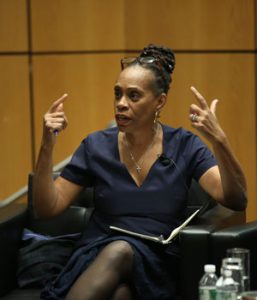
Williams-Isom said that she recalled a time when she was working as the executive officer of the anti-poverty organization Harlem Children’s Zone, and felt that the hard skills she brought to the job weren’t enough to address the challenges of poverty her organization was trying to solve.
“I have all these [skills]—I have a law degree—and I was like ‘I need something else,’” she said, adding that she decided to get a doctorate in ministry to help with the spirit and “soul part” of her job. “I felt like I had these hard skills, but if I didn’t have the ability to see some hope in a healing, radical love kind of way, I wasn’t really going to be prepared to do this work.”
Massingale said that Fordham has an opportunity to provide students with those “softer skills,” like critical reasoning and a desire to help those in need, that can help them face difficult situations.

“I think all too often we kind of apologize for a liberal education, saying that it’s not practical,” he said. “And what you just said is ‘yes, we can give skills, but skills are going to become outdated.’ What we need is something more—what’s going to keep you in this fight, especially when you don’t see how your skills are making any practical difference.”
Fisher said that one of the things that she tries to teach her students is “cultural and ethical humility.”
“How are we giving students that kind of tool?” said Fisher, whose Center for Ethics Education oversees Fordham’s master’s program in ethics and society. “As part of the Jesuit tradition, it’s an openness to others, as well as a desire and a need and understanding of self-reflection of our own biases, but also understanding that we cannot help people if we do not understand the social, political life that they’re living in.”
Fisher gave an example of students doing research and how they “can’t just be studying the individual, they have to be looking at the context in which the individual is engaged.”
Continued Growth and Improvement
Massingale said that the Jesuit values and ways of teaching, such as those that Fisher used to describe her students’ research, could be even more emphasized at Fordham.
“I think where we could do better is to think of something like the Jesuit universal apostolic preferences, where it talks about walking with the excluded, where it talks about walking with youth to give them a hope-filled future,” he said.
The panelists also called on the University to make sure it was continuously working to improve and address when “the fractured world” and its problems appear on campus, which was something that Tetlow reflected on in her closing remarks.
“I love the challenge to us, as an institution, to model our values and how we make those difficult choices…of how we collectively decide what kind of community we create and all the ways that we often fail in that regard, but forever strive to do better,” she said.
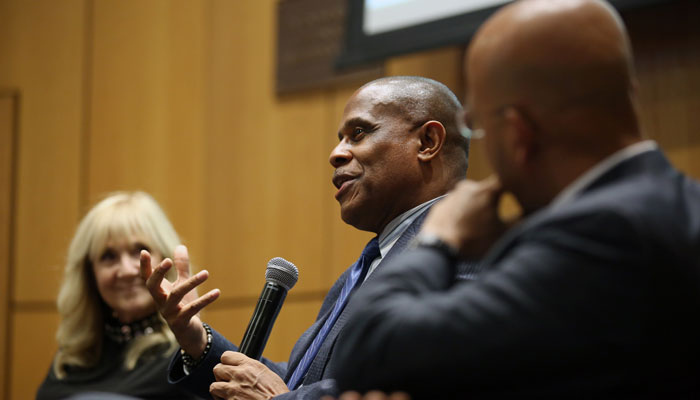
Learning From the Students
One way the University can make sure it does that is by listening to and learning from its students, Tetlow said.
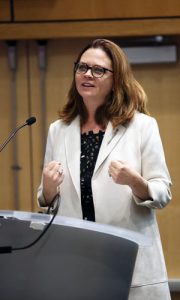
“How we are willing to teach our students to question assumptions and challenge authority, knowing that they will turn that on us, and to be proud of them when they do it—even if it takes a minute,” she said.
Fisher said that this is something she’s taken to heart in her years of teaching.
“It’s very important that … we as professors indicate that we are open to learn, that we recognize that our life experience is not your life experience. What can you tell me? How can I help you? How can I connect you to others, whether it’s inside the University or outside, who can give you more than I can from that world perspective that we need,” Fisher said.
That message was echoed throughout, as the panel started with a video of eight students sharing their experiences about why they decided to go to Fordham.
“I came to Fordham Law to represent low-wage immigrant workers, particularly undocumented workers who have their wages stolen by bad employers,” Anthony Damelio, FCRH ’08, LAW ’22 said in the video. “Fordham Law gave me not only the tools necessary to become an excellent advocate for my clients, but it also stoked the flames of justice within me that are essential to lawyering for social change.
Williams-Isom emphasized the importance of centering the student voice.
“In some ways, we probably should always start with the student voice, because it keeps us grounded, and there certainly was a lot of hope there,” she said.
]]>The state was North Carolina, and many of the people he met there were immigrants who had suffered greatly before coming to work at the cooperatives that he was visiting with other Fordham students. Listening to their stories “just put a lot of things into perspective for me,” he said.
Grullon is one of many students who spent their spring break with Global Outreach, Fordham’s service and cultural immersion program that runs projects—in the United States and abroad—that are centered on social justice and community engagement.
For Grullon and eight other students, the experience was a gift—quite literally. As students who came to Fordham via its Higher Education Opportunity Program (HEOP), they have high financial need. Except for the small portion for which they raise funds themselves, the students’ costs for the weeklong projects in North Carolina, Puerto Rico, and St. Thomas were covered by members of the Fordham University President’s Council, a group of accomplished alumni who mentor students and help advance the University.
By giving in support of the students, they were advancing a key priority of the University’s $350 million fundraising campaign, Cura Personalis | For Every Fordham Student—ensuring that the full Fordham experience is accessible and affordable for all students.
A Southern Excursion
The experience in North Carolina was eye-opening for Grullon and other students. “The culture is so different,” he said, noting how open and friendly everyone was. They were visiting worker-owned cooperatives making a variety of clothing and, at the same time, learning firsthand about sustainable sourcing and ethical business practices.
Giovanni Alva, FCRH ’22, a Bronx native who is now a first-generation college graduate, said the work at the clothing cooperatives made him appreciate the exhausting textile work that his own parents performed in New York City after immigrating from Mexico.
“Being able to see it in person made me realize, so much, the sacrifices that they went through … to give me the opportunity to even attend Fordham and reach my potential,” he said. The workers in the co-op seemed grateful to have health care and other benefits, and to be able to become co-owners of the company, he said.
Grullon, a first-generation college graduate himself whose parents come from the Dominican Republic, said he met immigrants including a young Hmong woman who played a managerial role in one of the cooperatives. She had spent a lot of time healing from scars, both physical and mental, that she had suffered in an internment camp before coming to America. “There were so many people just telling us similarly tragic stories,” he said. “It just taught me that … everybody just has their own struggle in life, even though you don’t see it.”
He was happy to be able to bond with other students in a way that he hadn’t before, since he was a commuting student for most of his time at Fordham. “I got a lot of good friends because of this trip, and I don’t feel as alone as I did before,” he said. “And that’s a huge thing.”
A Gift of Experience
For the past few years, when he has visited New York City high schools to tell students about HEOP, Biswa Bhowmick, associate director of the program, has been telling students about Global Outreach as a way to show what Jesuit education is about and illustrate cura personalis—or care of the whole person—in action.
In fact, he said, “this is basically our dream, to make [Global Outreach] an integral part of the HEOP experience” for all who seek it. In 2018, Anne Williams-Isom, FCLC ’86, became the first President’s Council member to give in support of this goal, and others have since contributed, including Christina Luconi, PAR, and Christine Valentic, FCRH ’04.
After meeting with Bhowmick and learning more about HEOP, Valentic said, “I just really fell in love with the program and the idea of being able to give these students the experience that they might not have been able to have.” She knew what it was like to benefit from others’ giving, since her parish’s “adopt a student” giving program had funded her Catholic school tuition. At Fordham, she had wanted to take part in Global Outreach but hadn’t had the means.
The Global Outreach program has been growing its funding sources for students; today, it offers scholarships to about a third of participants, and students also organize fundraisers to cover a portion of the trips’ cost, said Vanessa Rotondo, assistant director of immersions and senior adviser on Ignatian leadership with the Center for Community Engaged Learning, which oversees Global Outreach.
Costs for the spring break trip ranged from $600 to $1,600 per student, which they can find daunting, Bhowmick said. When they learn that their share of the cost is much smaller, he said, “that really changes the whole perspective for them.”
One HEOP student, Najelly Almonte, who is going into her senior year at Fordham College at Rose Hill, first learned about Global Outreach during the summer before her first year at Fordham, and found that financial worries never took hold.
“HEOP has always been open to the idea, ‘If you want to do anything on campus, we will help you with the funding,’” she said. “It feels nice to have that support and feel like you’re not alone and, like, ‘Oh, I can’t afford this, I can’t do the same thing as everybody else in college.’”
Discovering Education in Puerto Rico
Almonte was one of the students who went to San Juan, Puerto Rico, to help paint a mural on a middle school building that was being restored after hurricane damage. They worked with the Puerto Rican artist Pablo Marcano García on the mural, an illustration that celebrates the importance of teachers and the past, present, and future of education.
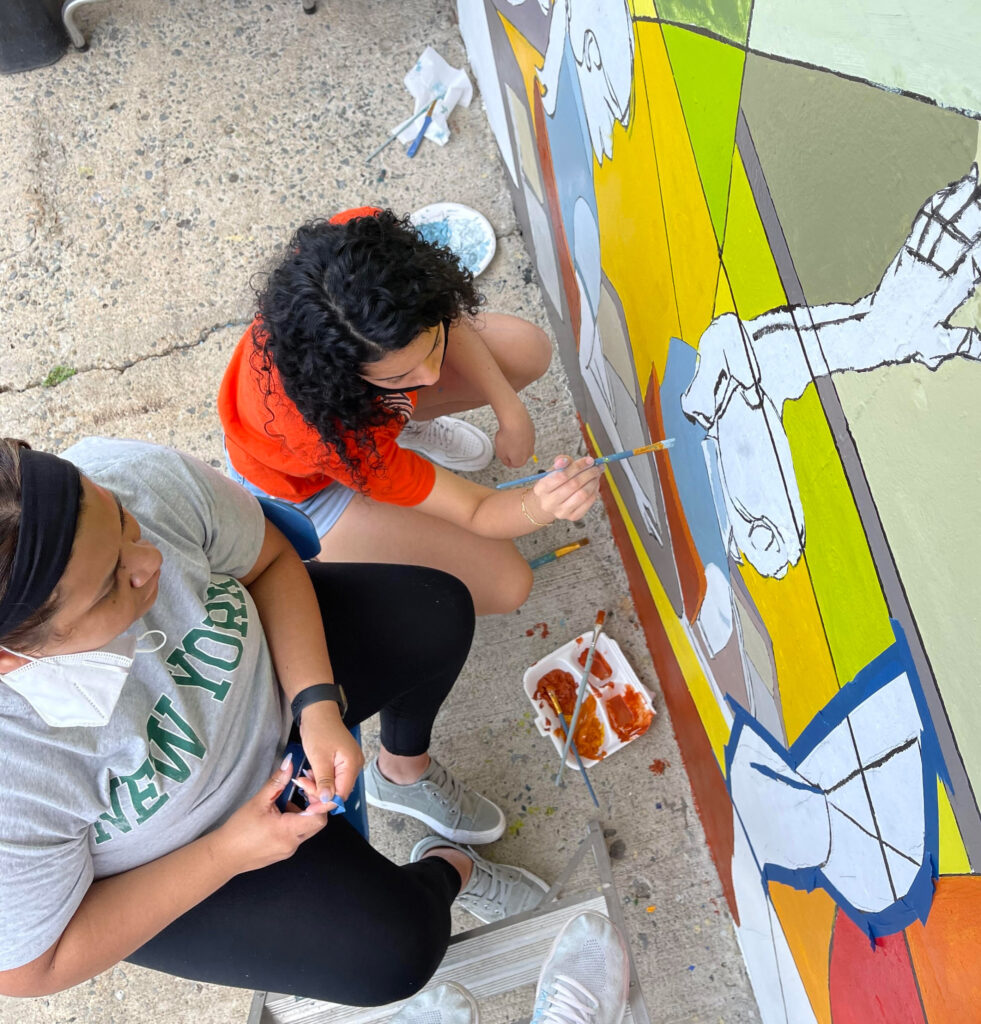
Meanwhile, the teachers at the school were on strike, which the students learned was “a regular thing,” said Cira Merlin, a participant who is going into her junior year at Fordham College at Rose Hill. “As we were painting to show teacher empowerment, how important these teachers are … they’re fighting for their pay,” she said.
The students were hosted by APRODEC, a nonprofit corporation that promotes local, sustainable economic development. They had the chance to tour historic sites, talk with students at the school, and learn about local culture and Puerto Ricans’ pride in their heritage.
“When I talk about this trip, I wouldn’t dare say ‘community service,’ because this was so much more than that,” Merlin said. “We were learning from the school, from the students, from the community. It was so much more than a service trip.”
Because of the project, she said, “I would say my love for education really grew.”
To inquire about giving in support of the Higher Education Opportunity Program, Global Outreach, or another area of the University, please contact Michael Boyd, senior associate vice president for development and university relations, at 212-636-6525 or [email protected]. Learn more about Cura Personalis | For Every Fordham Student, our campaign to reinvest in every aspect of the Fordham student experience.
]]>Mayor-elect Eric Adams announced Williams-Isom’s appointment during a press conference on Monday, Dec. 20, where he introduced four other women who will serve as deputy mayor in his administration.
“You are just seeing the coming together of an amazing team,” Adams said. “This is going to be my core leadership, and they are going to ensure that we move our city in the right direction.”
In her role as deputy mayor, Williams-Isom, a 1986 graduate of Fordham College at Lincoln Center, will oversee the city’s health and social services agencies, including the New York City Health and Hospitals Corporation, the Department of Social Services, and the Administration for Children’s Services. She’ll work to address the needs of seniors, children, victims of domestic and gender-based violence, and people struggling with hunger and homelessness. One of her main areas of work will be to continue to guide the city’s COVID-19 response and address some of the issues exacerbated by it, including a growing need for mental health services.
“We’ve all been hit hard by this pandemic, and we are all feeling it. But I know that this administration will help us get through. We will heal, and we will heal together,” Williams-Isom said after the announcement.
Williams-Isom will be sworn in on Jan. 1, along with Adams and the rest of his administration.
She was raised in Queens by a single mom, a Trinidadian immigrant and a nurse who always stressed the value of a good education. After completing her bachelor’s degree in psychology and political science at Fordham College at Lincoln Center in 1986, Williams-Isom went on to earn a J.D. from Columbia Law School. She also received an honorary doctorate from Fordham in 2018.
Lifting Up Those in Poverty
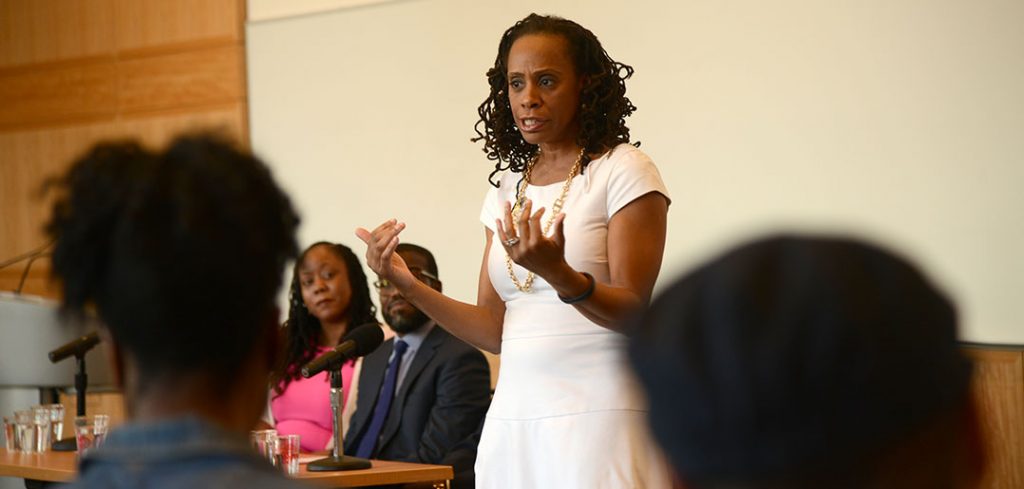
(photo by Tom Stoelker)
Williams-Isom is no stranger to working with people in need, particularly children and families in poverty. Prior to returning to Fordham as the Dumpson Chair, Williams-Isom spent more than 10 years at Harlem Children’s Zone (HCZ), a nonprofit anti-poverty organization, first as its chief operating officer and then as its CEO. The organization was praised by former President Barack Obama as a “model anti-poverty program for the nation.”
More than 25,000 children and parents in Central Harlem participate in the organization’s “cradle to college pipeline” programs that aim to break the cycle of generational poverty through workshops for new parents, academic help in HCZ-run charter schools, and college prep services.
“It’s not just me running a school well or an after-school program well. I’ve got to run 24 different programs really, really well. Mediocrity can’t be,” Williams-Isom told Fordham Magazine in 2014 after her appointment as CEO. “It comes down to this sense of urgency: How many generations are we going to let fail?”
Williams-Isom continued those efforts in her most recent role as the James R. Dumpson Chair at Fordham, where she worked with faculty and students to develop research, programs, and policy analyses that improve services to at-risk children and families.
The position was named after James Dumpson, a former dean of Fordham’s Graduate School of Social Service who, like Williams-Isom, worked on bettering the lives of children. He was a social worker, professor, and administrator who began his career as a children’s caseworker and rose to become New York City’s first Black welfare commissioner in 1959.
“For me to be able to come back [to Fordham] and really think about service and what it means to serve the most vulnerable is an honor. Put that together with Professor Dumpson’s vision—and as an African American woman—I think he would be super proud to see me in this position,” she said.
When she took the role in 2020, Williams-Isom said that for years she had been working to help provide a “holistic approach to our children and families,” and that she appreciated Fordham’s commitment to cura personalis, or care for the whole person.
“I think attending to somebody’s spirit is very important, especially with the trauma that we have seen, based on the policies under which disenfranchised folks have had to live in this country,” she said.
Working for the City
When Williams-Isom is sworn in on New Year’s Day, it won’t mark her first experience in New York City government. She spent 13 years, from 1996 to 2009, in the city’s Administration for Children’s Services, first as the director of the Office of Community Planning and Development, then as special counsel to the commissioner and as associate commissioner for external affairs, and finally as the deputy commissioner for community and government affairs. Before working for the city, Williams-Isom worked for five years as a lawyer after graduating from Columbia Law School.
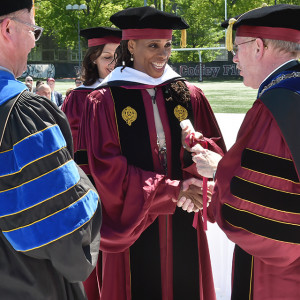
In 2016, she was appointed by New York City Mayor Bill de Blasio to his Children’s Cabinet Advisory Board.
Earlier this month, in her role as the Dumpson Chair, Williams-Isom convened a group of more than 175 parents, community activists, lawyers, academics, nonprofit leaders, and government employees for the first of four meetings to discuss ways to reform the child welfare system, which has been disrupted by the COVID-19 pandemic. The discussion, titled “Narrowing the Front Door to NYC’s Child Welfare System,” will resume in January.
At the initial meeting, Williams-Isom said she has spent years thinking about ways to fix the child welfare system, dating back to her first stint with the city in the 1990s, and she noted that it disproportionally affects families of limited means and those who are Black and Latinx.
“There are people who say you have to blow up the whole system, because it’s terrible and based on racist principles, and we can’t fix it,” she said. “Then there are people who are reformers like me. I call myself ‘abolition curious.’ I’m kind of beginning to see it’s not as easy to change systems and take out the years and years of racism in them.”
In her new role, Williams-Isom will be tasked not only with reforming the child welfare system but also overseeing critical health and social service agencies dealing with inequities that have been exacerbated during the pandemic. After she was inaugurated as the Dumpson Chair, she said now is the time to take a look at these services anew.
“We have agency and we have choices,” she said, adding that the necessary changes will take what journalist Isabel Wilkerson has called “radical empathy.”
“Radical empathy is not about you and what you think about a situation that you have never been in and probably never will be in,” she said. “It is a kindred connection from a place of deep knowing that opens your spirit to the pain of another as they perceive it.”
]]>On Dec. 8, a group of nearly 175 parents, community activists, lawyers, academics, government employees, and nonprofit leaders came together for the first of four Zoom meetings to discuss what happened and what can be done to reform the system.
The group effort, titled “Narrowing the Front Door to NYC’s Child Welfare System,” is a part of the Graduate School of Social Service (GSS) James R. Dumpson Children and Families Summit, and is sponsored by the Redlich Horwitz Foundation.
Harnessing Data from the Pandemic Months
Anne Williams-Isom, FCLC ’86, who was appointed the James R. Dumpson Chair in Child Welfare Studies at GSS in 2020, said the group is geared toward taking advantage of several unique opportunities. The first is that the pandemic served as a real-life experiment on what would happen if the child welfare system was effectively put on pause for 18 months. The second is the fact that New York City will have both a new mayor and a new governor next year who might be open to changes based on new information gathered over the last year and a half.
“We don’t have to reimagine what could happen [if we make changes]. We actually have some data,” said Williams-Isom, a member of the University’s President’s Council, who was appointed New York City’s deputy mayor for health and human services in December.
“So, what does this suggest in terms of the practices and the policies that we want to have in child welfare, moving forward?”
Williams-Isom, who came to Fordham after serving as CEO of the anti-poverty organization Harlem Children’s Zone, said she’d been thinking about how to fix the system, which disproportionally affects families of limited means and those who are Black and Latinx, since the late ’90s, when she first started working for ACS. She served as deputy commissioner for the agency from 2006 to 2009.
“There are people who say you have to blow up the whole system, because it’s terrible and based on racist principles, and we can’t fix it,” she said.
“Then there are people who are reformers like me. I call myself ‘abolition curious.’ I’m kind of beginning to see it’s not as easy to change systems and take out the years and years of racism in them.”
Producing Reports
After each of the meetings, discussions are being summarized in working papers, and the final result will be a report that will be presented to state and city authorities.
The meeting on Dec. 8 was organized so that all participants’ voices would be heard. Before heading into break-out rooms of four for 20 minute-long discussions, participants listened to Anna Arons, an acting assistant professor of lawyering at NYU School of Law, present the findings of her forthcoming paper An Unintended Abolition: Family Regulation During the COVID-19 Crisis, (Columbia Journal of Race and Law).
Before the pandemic, Arons said, 65,000 reports were submitted to ACS annually, mostly from mandated reporters such as schoolteachers and administrators. Eighty-five percent of those reports were for neglect, not the kind of abuse that receives news headlines when it goes undetected. Just as notable, she said, is the fact that 65% of reports were judged to be unsubstantiated.
“It bears noting that, even if these investigations don’t end up in family court, they are incredibly invasive, and even if they don’t result in a family separation, they involve an agent of the state who’s entering people’s homes, often unannounced in the middle of the night, demanding to see the child’s nude body, and demanding to look in every cabinet,” she said.
“It’s just a terrifying experience for any person to go through, even if that’s the end of it.”
It’s not a system that equally affects all New Yorkers either, she said, as 90% of those reported are Black and Latino, and live predominantly in lower-income neighborhoods.
In March 2020, however, schools shifted to remote learning, ACS outreach workers conducted visits remotely—and thus scheduled them in advance, and family court was instructed to only take up cases on an emergency basis. As a result, the number of reports, investigations, and children taken from their families was cut in half.
Even now, with the pandemic receding and schools reopened, there have been no indicators that abuse that took place over the last 18 months was missed, or that it is being detected in higher levels now, she said.
“We have this period when we can now see that children are staying safe not because of the family regulation system, but in its absence,” said Arons, who noted that in June, ACS commissioner David Hansell testified to the same effect.
It’s no coincidence that this period was also one in which more government assistance was distributed to families, via stimulus checks, unemployment benefits, and child tax credit, with fewer strings than essentially any other period since the New Deal, she said.
“How do we solve child neglect and keep children safe in this country? We give families money so they can keep their own families safe, and we don’t require the government to come in and police them and say ‘This is how you need to raise your children,’” she said.
The next discussion, which will take place on January 19, will focus on how New York City’s child welfare system is funded. The last two discussions will focus on what help should look like and a discussion of recommendations and collective action.
]]>The event, titled “A Conversation About the Well-Being of America’s Children,” included the presentation of distinguished chair medals by Joseph M. McShane, S.J., president of Fordham.
“Thank you for dedicating your lives to the protection and the cultivation of hope in the hearts of children, especially children who have been forced by circumstance to live at the margins of society,” he said.
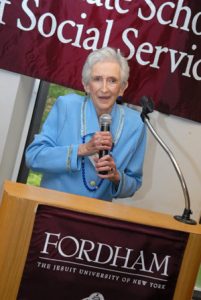
In a short talk following her induction, Gatenio Gabel thanked the Quaranta family for funding the chair honoring Mary Ann Quaranta, D.S.W., who died in 2009. Quaranta, a graduate of the GSS class of 1950, would go on to serve as dean of the school from 1975 to 2000, taking it from a small local school to one that ranked eleventh in the nation. She also established the school’s doctoral program. Like Dumpson, she was named a Social Work Pioneer by the National Association of Social Workers.
Gatenio Gabel has served as a consultant to UNICEF, UNESCO, and U.N. member countries on child poverty, advocacy, and protection. She’s twice been awarded Fulbright Scholarships to study child and family policies.
Her talk detailed how racial inequities have become embedded into the American child welfare system. She said that in the early part of the 20th century, social work pioneers identified potential harm that could come to children and pushed for laws on child labor, welfare, schooling, and a juvenile justice system—all of which ignored class and race disparities.
“Many scholars have questioned whether the reformers were acting in the best interest of children, or whether the intent was to extend governmental control over children of the poor,” she said.
She noted that the 1980s was the last time white children were in the majority; by 2040, she said, they will comprise 43% of the child population. Black children are three times more likely to live in deep poverty than white children, and Hispanic children are 2.5 times more likely to live in low-income households. Yet child welfare, health care, and educational systems continue to harken back to the turn of the last century when race was not a consideration.
“Our cries for justice for children today rest on our ability to build new anti-racist systems in social services, education, law, health, and law enforcement. Only when new systems are implemented will we be able to bring justice to all children in this country,” she said.
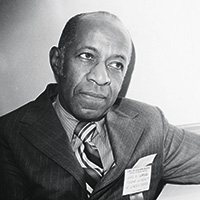
Following her induction, Williams-Isom noted that her chair’s namesake, James Dumpson, Ph.D., was an educator before he became New York City’s first Black welfare commissioner, and, later, dean of GSS, a position he held from 1967 to 1974.
“Social work and education are brother-sister professions,” said Williams Isom, who served as CEO of the anti-poverty organization Harlem Children’s Zone from 2014 to 2020. There, she oversaw all programs in the cradle-through-college pipeline to improve services and outcomes for 25,000 children and parents in Central Harlem. She agrees with Gatenio Gabel that the child welfare system needs a complete overhaul.
“There are 12 million children living in poverty today, making them the poorest age group in America,” she said, emphasizing that overall 32% of Black children and 23% of Hispanic children live in poverty. “And 320,000 children have been pushed into or near poverty due to the pandemic’s economic downturn.”
“I think that Dr. Dumpson would have been calling for us to reimagine literally everything that has been done before because it has not been working for so many children in our nation,” she said. “Many of the systems that serve Black and brown children are imbedded with systemic racism and so they can never achieve the outcomes that we seek.”
She said that while the pandemic may have shocked some about the inequities it exposed, people in affected communities weren’t surprised. Yet, she said that much could be possible in the post-pandemic world.
“We have agency and we have choices,” she said.
She said that the necessary changes will take what journalist Isabel Wilkerson calls “radical empathy.”
“Radical empathy is not about you and what you think about a situation that you have never been in and probably never will be in,” she said. “It is a kindred connection from a place of deep knowing that opens your spirit to the pain of another as they perceive it,” she said.
Taking on that perspective will allow policymakers, social work practitioners, and public and nonprofit leaders, as well as faculty at universities, to understand that child welfare systems need drastic change—even at the institutions they serve.
“We must finally admit that these systems were not designed with abundance in mind, they were not designed for people that we love and respect,” she said. “They’re designed as if resources were scarce and we just have to tolerate black and brown bodies.”
]]>
The chair is named for the late James Dumpson, a social worker, professor, and administrator who served as dean of GSS from 1967 to 1974. He began his career as a children’s caseworker and rose to become New York City’s first Black welfare commissioner in 1959. Like Dumpson, Williams-Isom has focused her career on helping children thrive.

“For me to be able to come back [to Fordham] and really think about service and what it means to serve the most vulnerable is an honor. Put that together with Professor Dumpson’s vision—and as an African American woman—I think he would be super proud to see me in this position,” said Williams-Isom, who is stepping down from her post at the Harlem Children’s Zone (HCZ) at the end of this month after six years as CEO.
Williams-Isom was raised in Queens by a single mom who always stressed the value of a good education. After completing her bachelor’s degree in psychology and political science at Fordham College at Lincoln Center, she went on to graduate from Columbia Law School. But she has seen the toll that crises and a lack of resources can take on a community’s children, and she is acutely aware of how the right support could propel young people and their families out of poverty.
On her return to Fordham in the Dumpson Chair, she will work with faculty and students to develop research, programs, and policy analyses that improve services to at-risk children and families. She’ll also develop a collaboration between the Graduate School of Social Service, Fordham Law School, and the Gabelli School of Business to create a leadership institute for students, practitioners, and agency leaders committed to change around issues of race and justice. She will also continue on as a member of the University’s President’s Council.
“GSS has gained an experienced, caring, and creative leader in Anne Williams-Isom,” said Debra M. McPhee, Ph.D., dean of the Graduate School of Social Service. “Her extensive knowledge of the needs of children and families has served to elevate the voices of New York City’s most vulnerable communities. We are proud to have such an outstanding partner in advancing the school’s commitment to racial and social justice.”
For Williams-Isom, connecting children’s services with other social services has been a constant throughout her career. At the Harlem Children’s Zone, she runs innovative “cradle to career pipeline” programming that aims to break the cycle of intergenerational poverty. From life-shaping early childhood, education, and career programs to community outreach and wellness initiatives, HCZ focuses on creating opportunities for children, families, and communities to thrive.
Before joining HCZ, she advised them on integrating neighborhood-based nonprofits into the schools. At the time she was deputy commissioner of New York City’s Administration for Children’s Services, a post she rose to after 13 years in a variety of leadership roles at the agency.
Child welfare isn’t about taking children out of bad homes, she said, it’s about providing parents with the support they need to raise kids safely and give them access to opportunities. To that end, bringing social services closer to the classroom is key.
Williams-Isom noted that while the COVID-19 pandemic has proved challenging for families, attendance at HCZ remains high, with 95% of elementary and high school students signing in remotely from home. She said the participation speaks to the desire of parents to be involved in their children’s education.
“Even with this, parents were sitting with their kids, learning, finding out resources in the community so that they could provide for their families because they don’t want a learning loss for their children,” she said.
She said that she plans to take a similar holistic approach toward educating social workers at Fordham. And as a lawyer, she knows that social workers don’t have a monopoly on social justice issues. She looks forward to mingling with future lawyers from Fordham Law, future nonprofit leaders at the Gabelli School of Business, and, of course, future teachers from the Graduate School of Education.
“I’ve been talking for years about a holistic approach to our children and families,” she said. “I can quietly say, I think attending to somebody’s spirit is very important, especially with the trauma that we have seen, based on the policies under which disenfranchised folks have had to live in this country.”
Williams-Isom is currently pursuing her doctorate of ministry. She said that she is pleased to be teaching at a Jesuit institution where cura personalis, care for the whole person, includes the spirit.
“I’m excited about being able to speak to people’s spirit and the soul work that each one of us needs to do in order to bring about real change in this country,” she said.
“Jesus was a revolutionary and he was working with the disenfranchised,” she said. “But this is less about preaching and more about using our voices to call out injustices where we see them, and inviting people to be a part of the solution.”
]]>